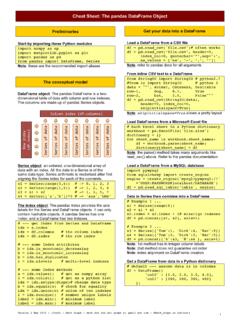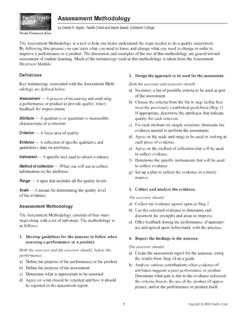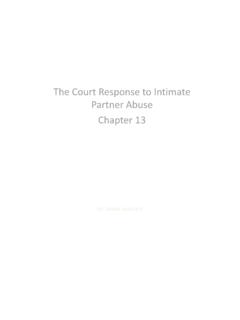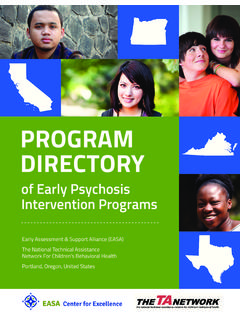Transcription of Chapter 13 Court Response to Intimate Partner Violence
1 Chapter 13. Court Response to Intimate Partner Violence Dr. Babcock Advocate Roles Advocates who may be indirectly involved with the Court system help with victim support and issues of safety when the survivor accesses the Court system. Some advocates may be directly employed by the Court and serve primarily to streamline access and coordinate services while dealing with safety issues. Advocates assist Intimate Partner Violence survivors with overcoming the obstacle of fear by providing information and support. Domestic Violence Advocates Domestic Violence advocates may assist survivors in applying for protections and resources. Examples of resources: Victim services - hotlines, support groups, and counseling resources Victim shelters - provide a temporary safe haven from abuse. Only a handful of shelters exist for battered heterosexual or homosexual men. A domestic Violence advocate: Is an individual with experience and training related to domestic Violence and/or crime victims' advocacy.
2 May be required to attend Court hearings in support of victims. Responds to hospital or law enforcement referrals to provide advocacy. Assists with filing forms for domestic Violence criminal and civil restraining orders. Domestic Violence Advocates Domestic Violence advocates provide: Legal advocacy services, such as notification of and accompaniment to Court hearings. Education regarding the Court system and domestic Violence . Assistance with obtaining protective orders. Liaison with prosecutors, probation officers, and Court personnel, as well as safety planning. Court Advocacy Courts are an intimidating place for survivors of crime. The forms necessary to request a civil or criminal protection or restraining order are confusing. Many survivors cannot afford to hire an attorney to help with the process. The victim/witness assistance program was developed to address these needs. Victim/Witness Assistants Victim/Witness Assistants Work for the survivor instead of the Court .
3 May or may not be specialists in domestic Violence , but are experienced in the Court process. Receive payment from fines collected from people convicted of criminal acts. Frequently accompany victims into Court , track the cases, and provide updates to the survivors. Dolores, (pictured right), has been a witness advocate in DV for over 26. years Victim Privacy Protections Protection order confidentiality: A survivor of IPV can request that their name, telephone number, and address not be made part of the public record when filing for a Court order of protection. Personal information from a driver's license may only be disclosed only to certain categories of requesters. The Social Security Administration that allows a victim to change their social security number. State-operated Address Confidentiality Programs (ACPs) provide victims of domestic Violence with a legal substitute address. The Role of the Courts Prosecution of domestic Violence cases is no longer exceptional or rare.
4 The prevalence of prosecution varies from one jurisdiction to another. Jurisdictions with specialized domestic Violence prosecution programs typically have the highest arrest prosecution rates. A large number of domestic Violence prosecutions are disposed of through plea bargains and sentencing negotiations. Specialized Prosecution Units Specialized units are key to successful IPV. prosecution. Better interagency collaboration between prosecutors, social service providers, victim advocates, and victims is one major benefit of these units. Units contain attorneys and victim witness coordinators with special training and skills in obtaining evidence and prosecuting sexual predators and offenders who batter. These specialized units are associated with expedited domestic Violence dockets. Court Jurisdiction A network of courts across the United States makes up the judicial system. Jurisdiction in the scope and authority of each Court .
5 The constitutional or statutory parameters within which judicial power may be exercised limit the Court to a geographical area and to specific subject matter. Court functions are similar from state to state, but the names used for the courts differ widely. Codes governing domestic relations belong in a body of law that is called civil law. In contrast, criminal law codes are concerned with civil or private rights and remedies. Civil Versus Criminal Court A criminal law violation can be tried in a Court of general jurisdiction at the state level. State codes include provisions for civil protection orders when a domestic relationship exists. An overlap of criminal law and civil law is inherent in family Violence cases. Traditionally, family courts of limited jurisdiction have handled relationship issues. Civil Versus Criminal Court As a result, a person can obtain a civil order of protection in a family or probate Court in addition to filing a petition for protection in the lower criminal courts.
6 Some criminal offenses have been added to the jurisdiction of family Court through state statutes. Concurrent jurisdiction occurs when different courts are each authorized to deal with the same subject matter within a similar geographical area. Guidelines on whether an offense belongs in family or criminal Court vary from state to state. Civil Versus Criminal Court Points that lead to the decision of whether a case belongs in the family Court or in a criminal Court include: Type of offense Relationship of the victim to the offender Age of the perpetrator The Role of the Judge The role of the judge in cases concerning domestic or Intimate Partner Violence is characterized by the Court jurisdiction where the judge resides. A judge that sits in a criminal Court will hear domestic- Violence -related crimes in addition to nondomestic- Violence -related crimes. The judge plays a pivotal role in the issuance of civil domestic Violence restraining.
7 His or her attitude and demeanor during the hearing helps ensure the likelihood of success of protection. Specialized Domestic Violence (SDV) Courts In specialized courts, judges have greater resources available and staff trained in domestic Violence issues. These courts are designed to increase victims' safety and hold defendants accountable. The Court is staffed by judges and utilizes partnerships with criminal justice and social service agencies. The Department of Probation dedicates officers from the intensive supervision program to work on the Intimate Partner Violence cases. There are nearly 300 courts nationwide that have special processing mechanisms for domestic Violence cases. Specialized Domestic Violence (SDV). Courts The term domestic Violence Court refers to courts that assign judicial officers to hear a special domestic Violence calendar, regardless of whether they hear those cases exclusively. Such courts were developed with the realization that noninjury cases of domestic Violence cases are often upstaged by more serious crimes, regardless of the potential for escalation into high injury or homicide.
8 These courts vary in their scope of jurisdiction, structure, and processes. Many domestic Violence courts have jurisdiction over the issuance of civil protection orders, but a few also have jurisdiction over criminal domestic Violence cases. Integrated Domestic Violence (IDV). Courts The most innovative model to address Intimate Partner Violence One judge handles criminal domestic Violence cases and related family issues, including custody, visitation, and civil protection orders, in addition to matrimonial issues. This approach seeks to handle all related cases pertaining to a single family where the underlying issue is IPV. Civil Protection Orders Until recently, protective orders were restricted to protect crime victims and witnesses from harassment by defendants. Civil protection orders are now available to adults in every state. These orders are generally referred to as restraining orders, since their intent is to restrain the perpetrator from further abusive behavior and to grant relief.
9 Civil restraining orders are an important tool in identifying and protecting domestic Violence victims. To qualify for this type of order, an abuse must have occurred that places the victim in fear of imminent serious physical harm. Violation of a civil protection order is a criminal offense and carries a penalty. Civil protection orders are domestic relations restraining orders in which the Court has issued a protection or restraining order designed to limit or eliminate contact between two or more individuals. Civil Protection Orders Civil protection orders apply to individuals who are in a domestic relationship. A valid order must be signed by a magistrate, a clerk, or a judge authorized to issue such orders. It contains the name of the person who is under the order as well as the name of the complainant or victim. An attempt must be made to serve the order on the offender. Batterer Intervention Programs Mandating offenders to attend a batterer treatment program is the most common Court Response to IPV.
10 About 90% of these batterer intervention programs are based on the Power and Control Feminist Model. The debate on the effectiveness of batterer treatment programs is ongoing.. Batter Program Procedures for Male Perpetrators Batterer programs typically consist of five stages: Intake and Assessment - The interviewer seeks information on the pattern and severity of the abuse toward current and past partners, children, and others. Orientation - New clients meet and are told the rules and goals of the program. Counselors attempt to develop a rapport with the participants. Victim Orientation - An opportunity for the person who was battered to meet with the staff. Program - Education on power and control issues and the development of critical-thinking skills are emphasized to help batterers understand and change their behavior. Ending the Program - Successful completion of the program may involve an exit project, such as a letter on how the client was affected by the process.












